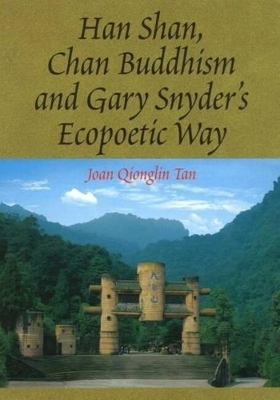
Han Shan, Chan Buddhism and Gary Snyder's Ecopoetic Way
Seiten
2009
Liverpool University Press (Verlag)
978-1-84519-341-6 (ISBN)
Liverpool University Press (Verlag)
978-1-84519-341-6 (ISBN)
Presents a comparative study of the ninth-century Chinese poet and recluse Han Shan (Cold Mountain) and Gary Snyder, an American poet and environmental activist. This book explains how Chan Buddhism has the potential to be recognized as an important voice in contemporary ecopoetry.
This book is a comparative study of the ninth-century Chinese poet and recluse Han Shan (Cold Mountain) and Gary Snyder, an American poet and environmental activist. Joan Tan explains how Chan Buddhism has the potential to be recognised as an important voice in contemporary ecopoetry. Mountain-seeing Chan/Zen theory and the nature -- Chan mirror are employed as aesthetic criteria to explicate the dual discourses -- spiritual and aesthetic -- which exist in Han Shan and Snyder's poetry and life work. Snyder's goal of establishing one ecosystem for all communities encouraged him to adopt Han Shan as an ideal (albeit Chinese mythical) model and Chan Buddhism as a global subculture representing environmental values. This book investigates how Snyder interweaves Chinese cultural sources in an eclectic way to impose a sense of place, a sense of mission and a sense of energy in his ecopoetry. His unique ideogrammatic method -- riprapping -- developed as a result of his literary indebtedness to the Oriental tradition, makes for a forceful statement on contemporary ecology. Through Snyder's successful translation, Han Shan has been revived as an immortal Beat Poet (Jack Kerouac features prominently in the chapters), while Cold Mountain has emerged as synonymous with enlightenment. Snyder himself has become an exemplary representative of an American Han Shan. The poetic line extending from Han Shan through to Chan/Zen to contemporary ecology is considered here as a continuum -- a continuum profoundly enhanced by Snyder's remarkable achievement of eco-wholeness -- the original goal of Han Shan in his ecopoetry. Complemented with full Chinese character text and Glossary.
This book is a comparative study of the ninth-century Chinese poet and recluse Han Shan (Cold Mountain) and Gary Snyder, an American poet and environmental activist. Joan Tan explains how Chan Buddhism has the potential to be recognised as an important voice in contemporary ecopoetry. Mountain-seeing Chan/Zen theory and the nature -- Chan mirror are employed as aesthetic criteria to explicate the dual discourses -- spiritual and aesthetic -- which exist in Han Shan and Snyder's poetry and life work. Snyder's goal of establishing one ecosystem for all communities encouraged him to adopt Han Shan as an ideal (albeit Chinese mythical) model and Chan Buddhism as a global subculture representing environmental values. This book investigates how Snyder interweaves Chinese cultural sources in an eclectic way to impose a sense of place, a sense of mission and a sense of energy in his ecopoetry. His unique ideogrammatic method -- riprapping -- developed as a result of his literary indebtedness to the Oriental tradition, makes for a forceful statement on contemporary ecology. Through Snyder's successful translation, Han Shan has been revived as an immortal Beat Poet (Jack Kerouac features prominently in the chapters), while Cold Mountain has emerged as synonymous with enlightenment. Snyder himself has become an exemplary representative of an American Han Shan. The poetic line extending from Han Shan through to Chan/Zen to contemporary ecology is considered here as a continuum -- a continuum profoundly enhanced by Snyder's remarkable achievement of eco-wholeness -- the original goal of Han Shan in his ecopoetry. Complemented with full Chinese character text and Glossary.
Joan Qionglin Tan, Associate Professor and Head of the English Department at Hunan University, China, and a Fellow of the Royal Asiatic Society in the UK, received her Ph.D. in English from the University of Wales in 2008. She has published books and articles in Chinese, on English teaching, translation and literature, and most recently has been working as a lecturer at the Centre for Chinese Studies of the University of Wales, Lampeter.
Introduction; Chan, Ecology and Ecopoetry; Han Shan's Poetic Way to Cold Mountain; Han Shan: Gary Snyder's Chinese Mythical Model; Han Shan, Chan and Ecology in Gary Snyder's Ecopoetry; Gary Snyder: An Exemplary Representative of an American Han Shan; Conclusion; Appendix; Glossary; Bibliography; Index.
| Erscheint lt. Verlag | 7.5.2009 |
|---|---|
| Reihe/Serie | The Liverpool Library of Asian & Asian American Studies |
| Zusatzinfo | tables |
| Verlagsort | Liverpool |
| Sprache | englisch |
| Maße | 246 x 171 mm |
| Gewicht | 564 g |
| Themenwelt | Geisteswissenschaften ► Religion / Theologie ► Buddhismus |
| Geisteswissenschaften ► Sprach- / Literaturwissenschaft ► Anglistik / Amerikanistik | |
| Geisteswissenschaften ► Sprach- / Literaturwissenschaft ► Literaturwissenschaft | |
| Naturwissenschaften ► Biologie ► Ökologie / Naturschutz | |
| ISBN-10 | 1-84519-341-5 / 1845193415 |
| ISBN-13 | 978-1-84519-341-6 / 9781845193416 |
| Zustand | Neuware |
| Haben Sie eine Frage zum Produkt? |
Mehr entdecken
aus dem Bereich
aus dem Bereich
Philosophische Betrachtungen
Buch | Softcover (2024)
Aufbau TB (Verlag)
12,00 €
Unterweisungen in Zen-Meditation
Buch | Hardcover (2024)
Arkana (Verlag)
20,00 €


